I continued cycling along the Karakorum Highway, riding beside the Indus River. For the first hour or so I was retracing the route I’d taken before my detour to Deosai. I passed the viewpoint for Nanga Parbat, and had a slightly better view this time around.
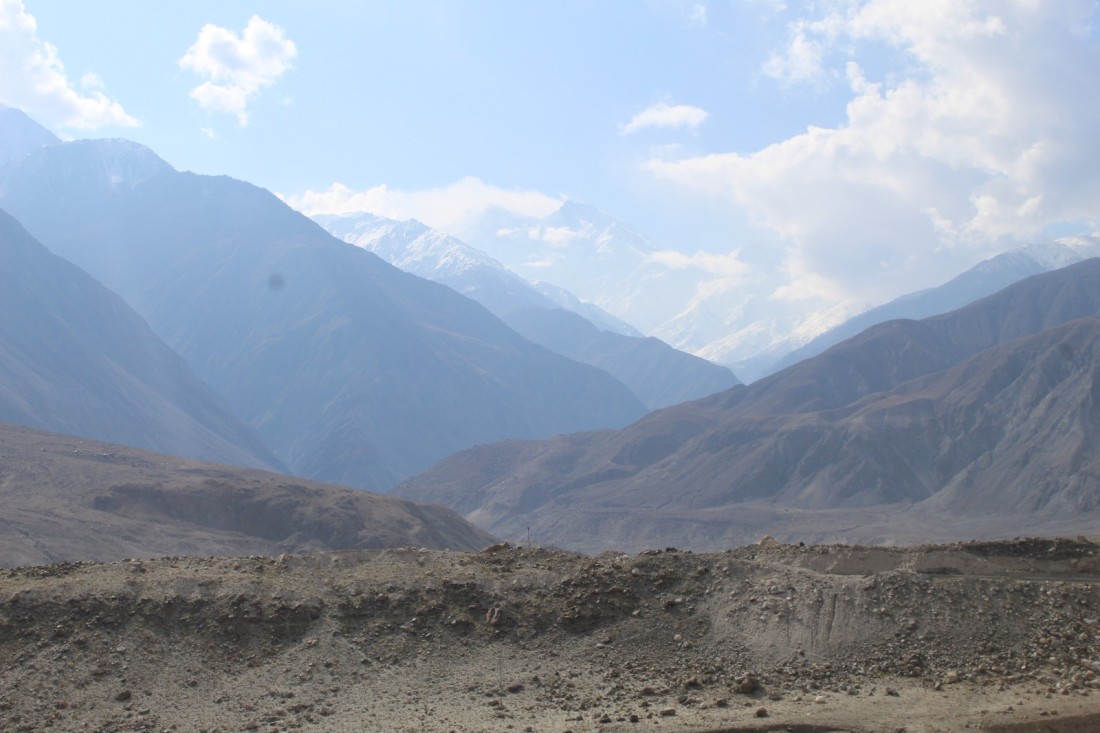
I wanted to take a shortcut over a pass called Babusar Top, cutting out a section of the KKH which supposedly passes through a more dangerous region, with enforced police escorts and/or lifts. Indeed I met up with one of these police vehicles shortly before the turnoff. They gestured for me to get in the back of their van but I continued cycling and they seemed content to follow.
At the turnoff itself there was a police checkpoint. They insisted the road over Babusar was impassable due to snow. I said I’d cycle up there and turn around if it was blocked. They insisted I couldn’t do that, and should instead take the KKH section.
There were lots of phone calls made with various people telling me I couldn’t go via Babusar as it would be impossible to cycle. Eventually I decided to just ignore them and go. I walked out of the building, ducked under a barrier and set off cycling. They didn’t seem bothered enough to do anything about it. From this checkpoint the road began a climb that would take me from 1000m to over 4000m.
A car passed a little while later. I’m not sure if the driver was a policeman, or just passing on a message. He said I should go back to the checkpoint to have my visa checked. I offered that he could take a photocopy of it, but he said he wasn’t returning to the checkpoint, but continuing on to Babusar – on the road I’d been repeatedly told was impassable. I would come to the conclusion over the coming days that Pakistani police lack any semblance of honesty, instead simply making whatever statement they think will get me to do what they want. Thankfully, they also seem to lack a willingness to overrule me when I insist on doing something.
A motorbike emblazoned with the words “tourist police” caught up a while later. The policeman said I would now be allowed to cycle this road, but I had to get a lift on the motorbike for the next five kilometres as it was too dangerous here. This was ludicrous – the next five kilometres were quite empty. I told him he could follow if he wanted, but I was going to continue cycling. He followed for a couple kilometres before growing bored and leaving me alone.
The road continued to climb and later on I passed through a few villages. In each village the kids would come running and try to keep up with me, running beside the bike and laughing. The road was steep they tended to be able to keep up for a fair distance!
Some of the kids were not so friendly, though. At one point I was hit with a stone thrown by a child in a passing pickup. Later, while some fifteen or so kids were running with the bike, one grabbed hold of my saddle bag. I stopped and told them not to do that. When I continued on, the same child grabbed a bag of sweets that were strapped on the back, then ran off with a few of the other kids. I spoke to some of the ones who remained. I asked them if they were Muslim, and whether they felt that was suitable Islamic behaviour. I’m not sure how much they understood but they did seem a bit sheepish! After a while a car passed and several men got out and, seeing the kids were bothering me, chased them off.
It may have been just my perception altered by these events, but the people in the villages during this climb seemed less friendly than elsewhere in Pakistan. They tended to stare silently rather than call out greetings, and rarely returned my waves or hellos. Most of the interactions came in the form of people telling me that the road ahead was closed. This happened frequently – at least ten people told me this over a couple of hours.
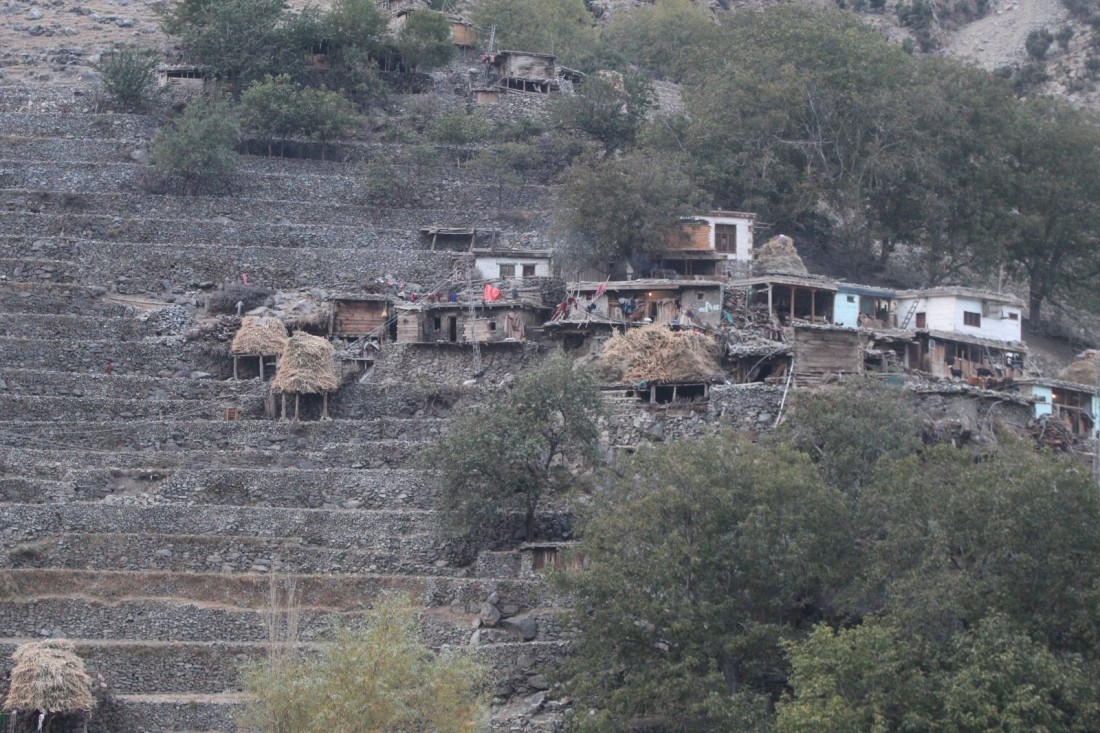
Later I was stopped by two policemen on a motorbike. One was very angry at me for cycling this road – “You attempt to do by bicycle what cannot even done by jeep,” he yelled as though this was a self evident impossibility. His colleague was much calmer. It seemed their main problem was that I was going to cycle over the pass at night. I assured them that wasn’t my intention; that I would sleep partway up and cross the pass the next day. This calmed them right down and they offered to let me sleep in a police station a few kilometres back. There were still a couple hours of daylight left though, and I wanted to do as much of the climb today as I could.
As it began to get dark, I tried looking for somewhere to camp. It was difficult though, as there seemed to always be someone watching. Even when there weren’t any houses around, people were standing around at the side of the road.
I reached a building with “hotel” painted on the side. It turned out to be a school. While I was there, though, a policeman showed up and said there was a police checkpoint in a kilometre or two, and I could stay there.
After a couple of kilometres I saw another motorcyclist policeman. This time the police checkpoint was apparently 5km away. On such a steep road that would take me the better part of 45 minutes, and in the end I found a spot to camp.
After an uneventful night I resumed cycling at around dawn. About five kilometres in I reached a village, with a policeman stationed at a bridge. He wouldn’t let me pass, and soon a bit of a crowd gathered. They all insisted the pass couldn’t be cycled. I told them of a pass I’d cycled in Georgia, where the snow was about 2 metres deep and the road nowhere to be seen. It was far worse here, they assured me. “No permission,” the policeman repeatedly insisted. I repeatedly stated that I would continue, and turn back if the road was impassable. Eventually he backed down and I continued on.
Shortly after was a police checkpoint. They again insisted I couldn’t cycle the pass. Their argument now was that I had to wait until a little later in the day, when it would be warmer. Wait an hour, they told me. I agreed to wait until 8 o clock.
At 8, I made to leave. The police told me to wait another hour – as I had expected they would. This time I told them I was going to be continuing regardless – as they had agreed to, after all. They said they had to have tea before escorting me. I told them I neither needed nor wanted an escort, but if they insisted they could catch me up later. They relented, and warned me not to go too fast. Climbing at an average gradient of around 8% at an elevation of over 3000m, that was unlikely to be a problem.
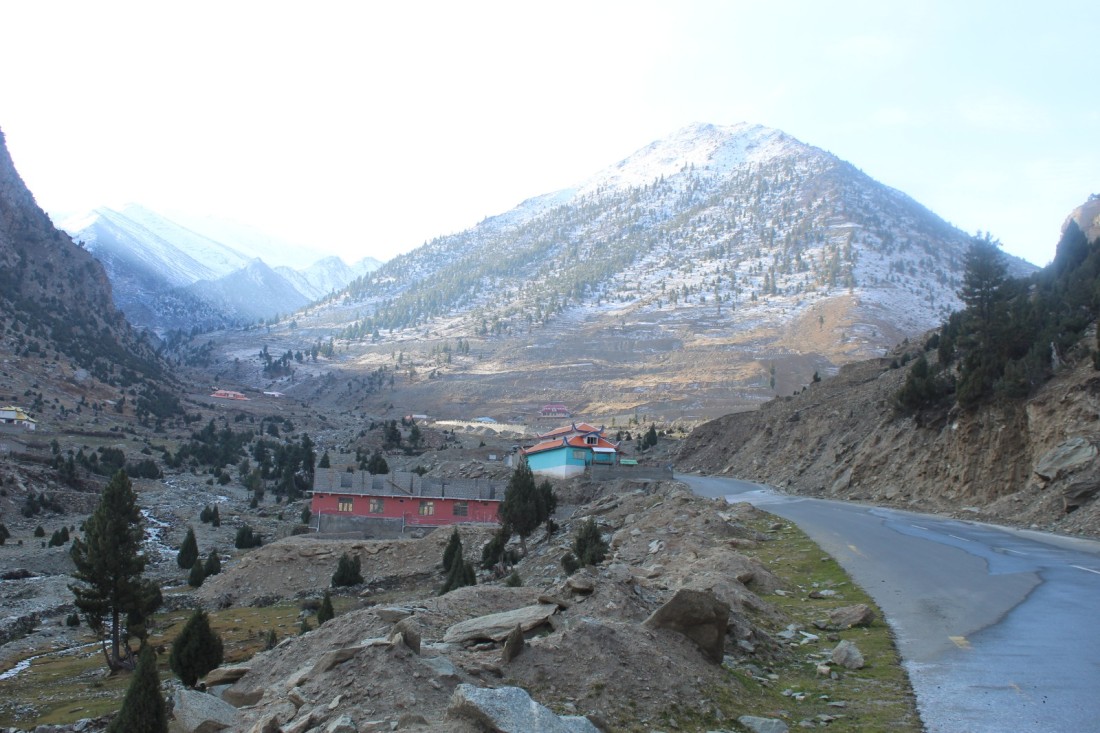
They caught up to me a while later and immediately started telling me to hurry up. I managed to refrain from pointing out that I’d be much further along if they hadn’t made me wait for an hour. The two policemen (one of them armed) followed the rest of the way on a motorbike.
As I slowly but surely made my way up the mountainside, there started to be some patches of snow next to the road. I might have wondered if there was a chance the police could have been being honest, but the occasional car coming down from the pass made it clear they had been lying about the road being closed.
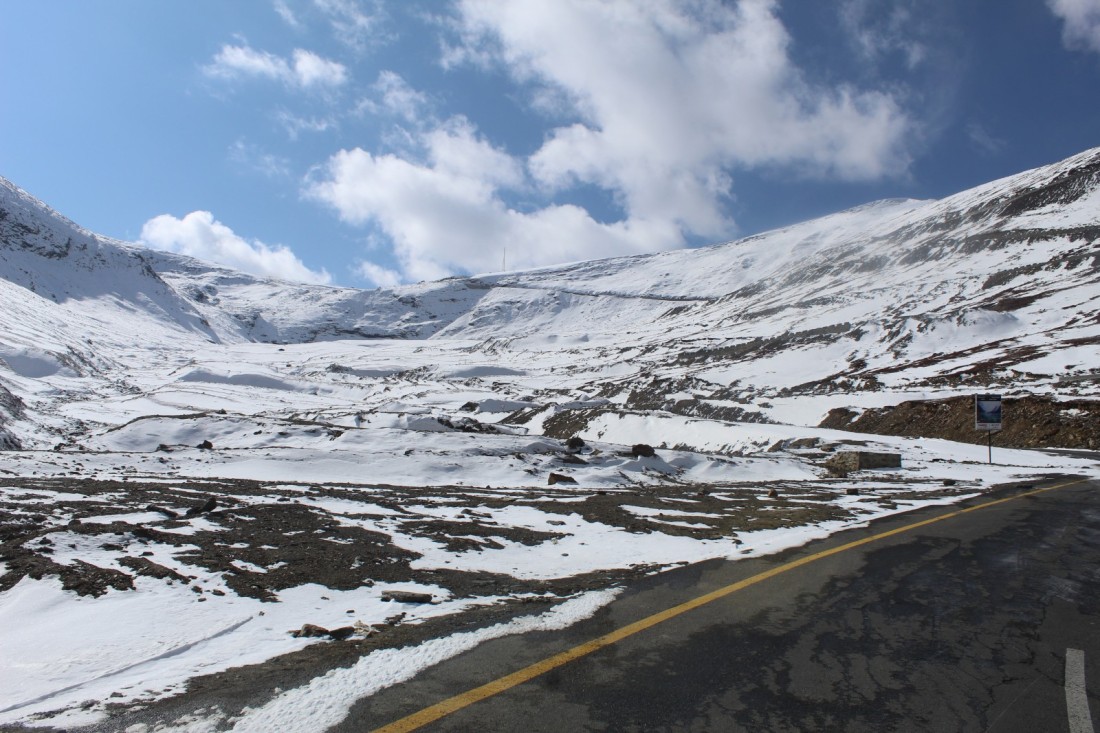
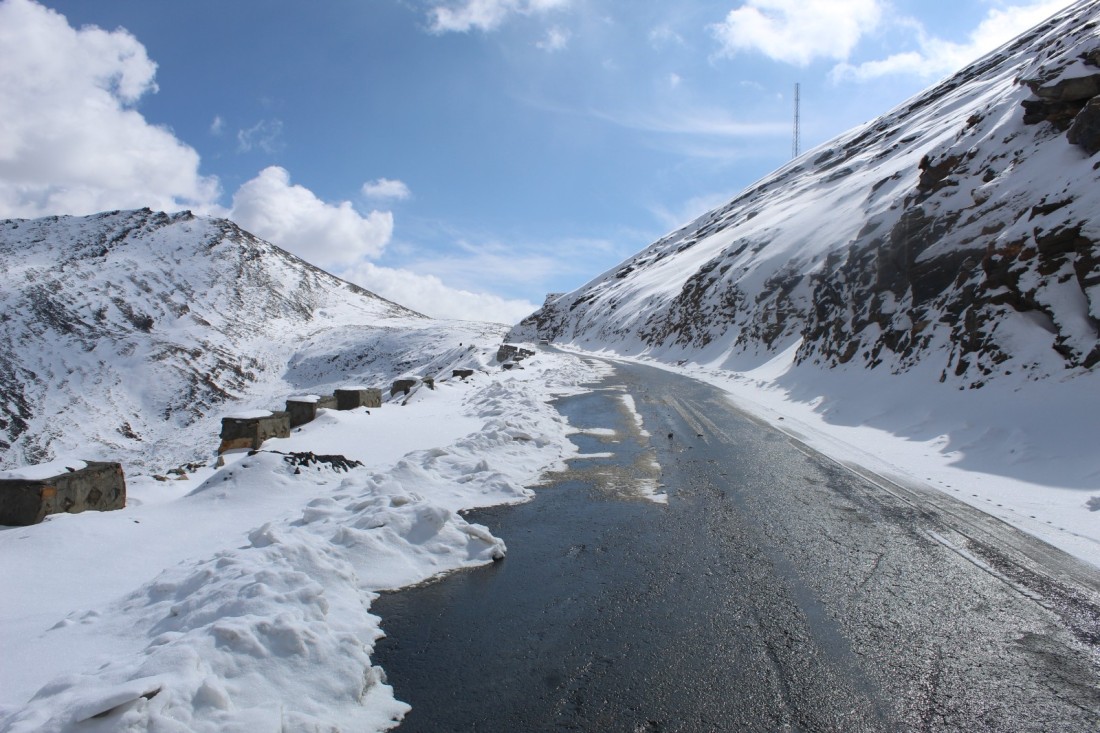
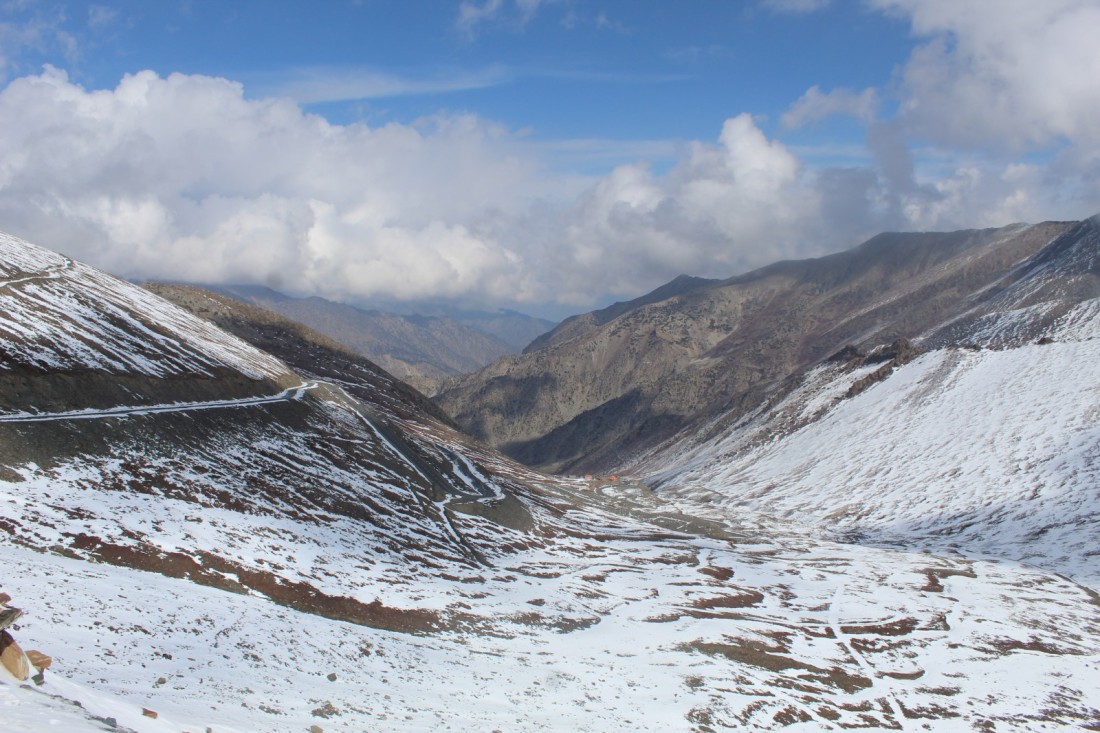
Toward the end of the climb, there were a few small patches of ice on the road. To be safe, I walked the last few hundred metres.
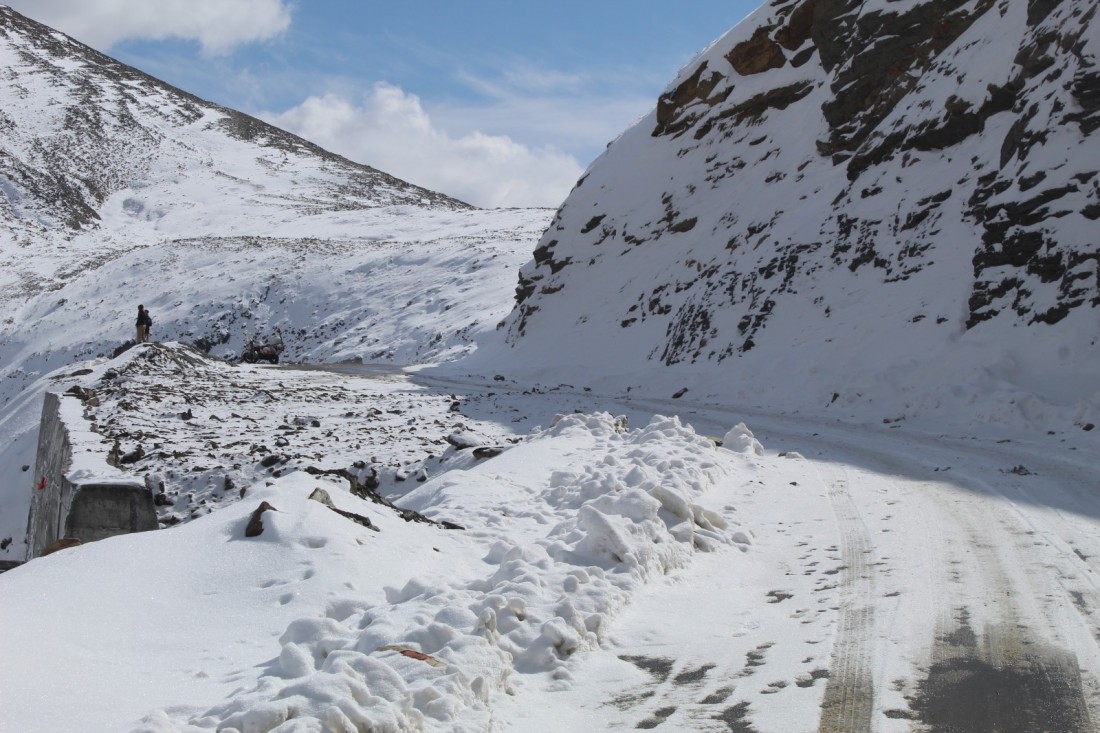
At the top of the pass, I stopped to have some food. One of the police told me not to waste their time. “As far as I’m concerned, you’re free to go back. You’re wasting your own time,” I told him. The view here was spectacular, only slightly marred by the irritating police.
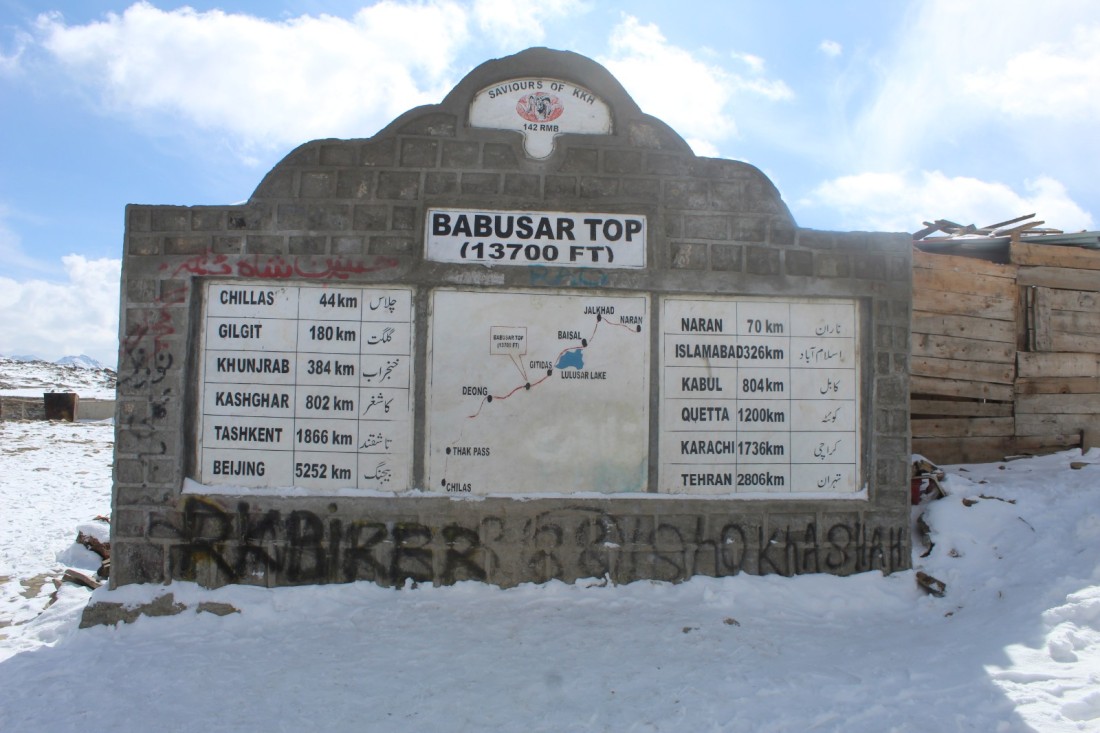
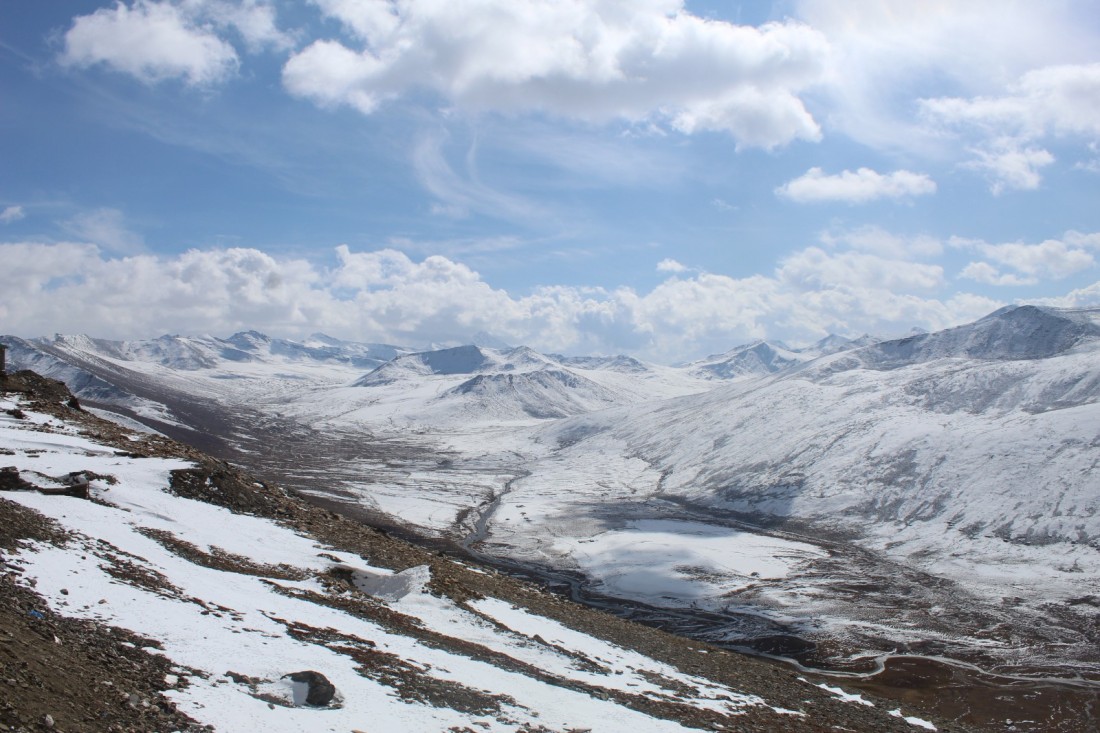
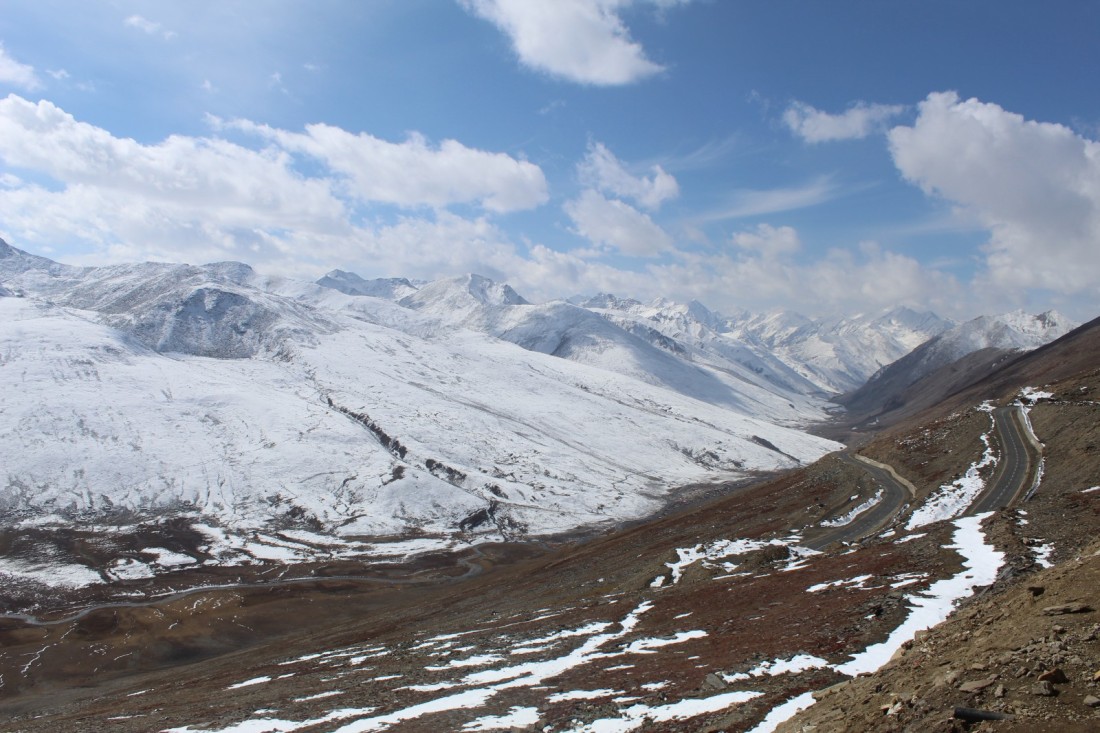
We then began our descent, initially winding down a series of switchbacks. My front derailleur jammed when I tried to shift gears, and the cable housing snapped. It turned out a small stone had got caught in the derailleur – it wouldn’t be usable until I replaced the cable housing.
The police insisted I stop at an empty checkpoint partway down the descent. While we waited for more police to come, I adjusted my front derailleur so that it would be fixed in the middle chainring. After a while they gave up on waiting and we continued on.
We met the new police escort some time later. There were five of them, with a van. A couple of them jumped out with their rifles and one told me to get in the van, which I of course declined. “That is an order.” I told him I’d be cycling.
A car stopped during our discussion. The occupants were a friendly Pakistani man with his Thai wife. I figured their presence probably made it less likely the police would force me into the van. The policeman insisted again, “I am ordering you to get in the van.” “No,” I replied. “I am going to cycle. If you insist, you may follow me.” After some discussion amongst themselves, the police agreed I could cycle.
These five policemen followed me for the next few hours. Three of them were generally quiet, while the other two had distinctly opposing personalities. One, Mr Chatty, would ask me questions whenever I stopped. The other, Mr Quickly, only seemed to know a few words of English. “Go. Quickly. Go quickly.” He also knew the word “wait,” but didn’t seem to grasp its meaning. When he said wait, I did so. He then irritatedly resumed his go/quickly tirade. I think he thought wait meant the same thing.
At one point I tried convincing them to leave me alone. I think I almost managed to sway them, but in the end they decided they had to keep tracking me. I asked why, and was told “Tigers. Robbery. Murder.” They often drove ahead, and out of sight. If a tiger did try and rob me, they wouldn’t have been much use.
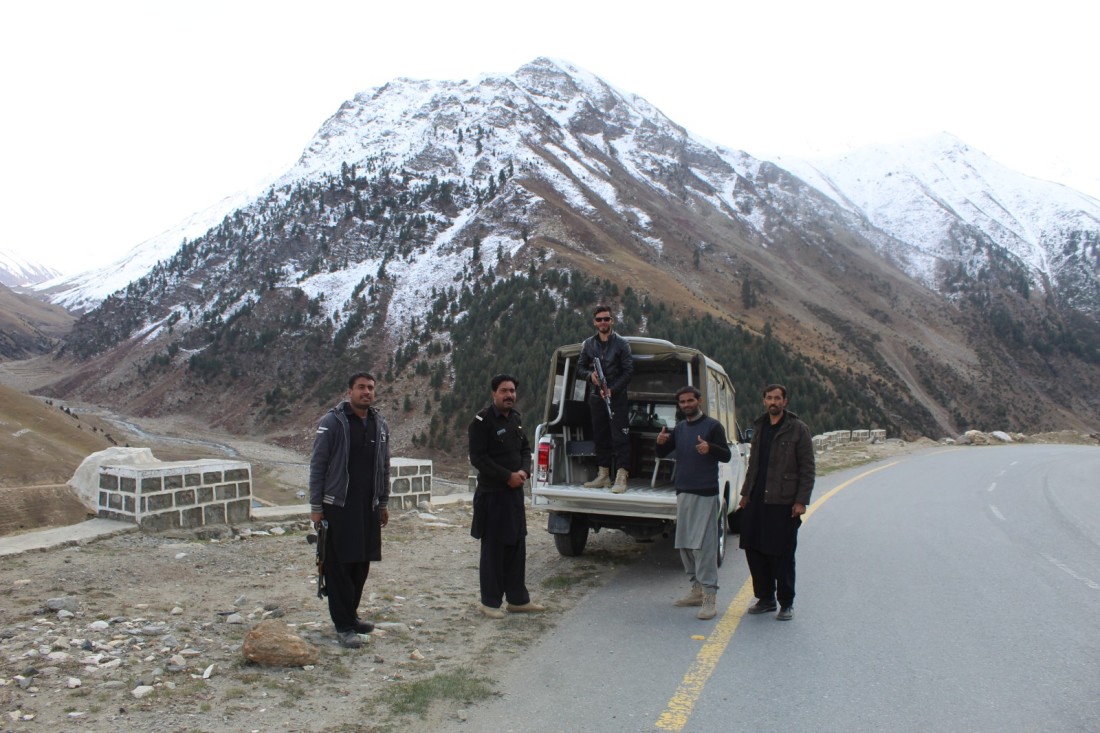
There were a few steep uphill sections to break up the descent. Due to my non-functioning derailleur, I had to stop and adjust the limit screws in order to swap between chainrings. I also had a slow leak in both tyres so I occasionally pumped them up. Mr Quickly was irritated by this while Mr Chatty took the opportunity to list some British cricketers.
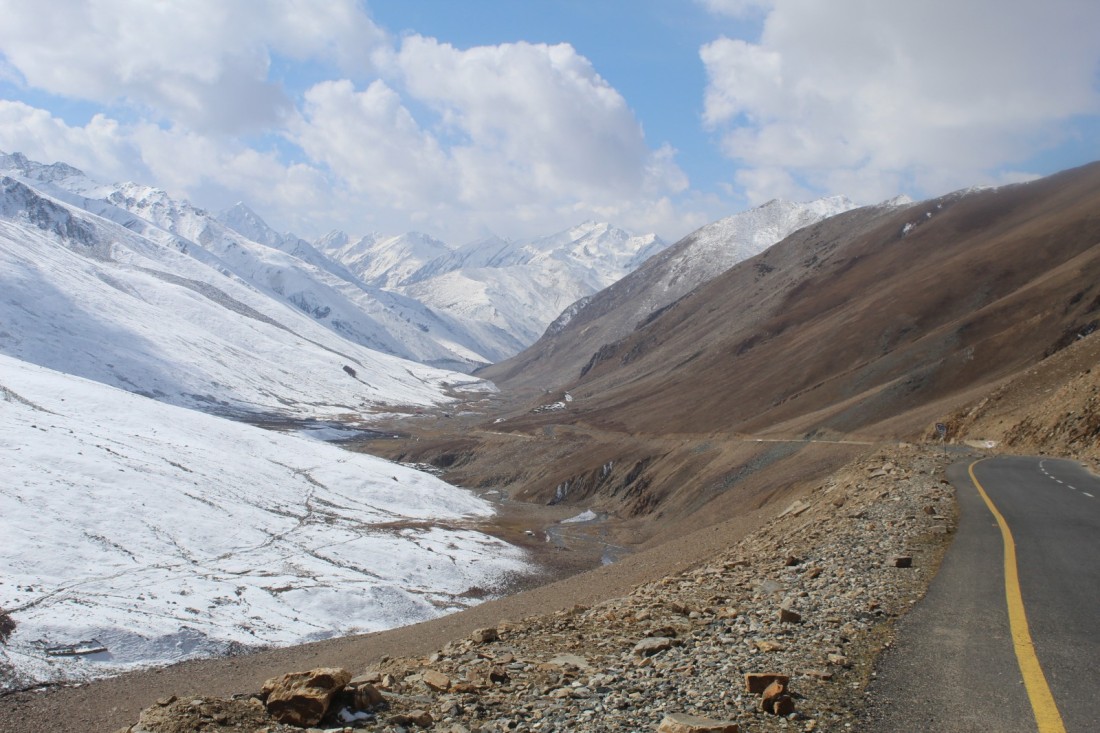
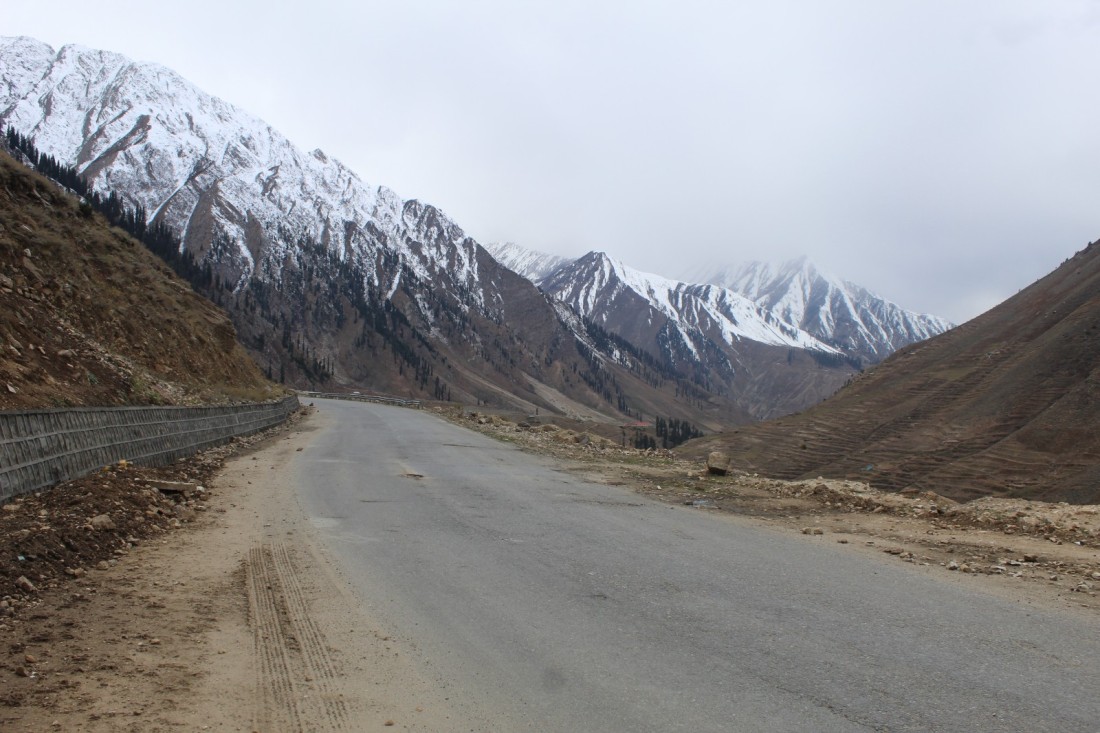
During the descent to the first town since the pass, the police van suddenly sped up and disappeared into the distance. I took the opportunity to take a break in the town. I was there for quite a while before the police returned. Mr Quickly was grumpy as usual and insisted we get a move on. Now the danger was apparently that it might snow. Quite apart from the fact that this seemed unlikely at this altitude, I wasn’t entirely sure how they hoped to prevent the snow with their rifles.
Anyway, it was only another fifteen kilometres to Naran, where I stopped for the day. After waiting a couple of minutes with the police I was allowed to go off and check into a hotel. I then went out for a pizza and to get some food from a minimarket. After I returned, the police showed up and informed me they were placing an armed guard at reception. Apparently I was to take him with me if I left the hotel – they were too late on that one!
The next morning I had some work to do on the bike. Both tyres had punctures, so they needed to be removed. Then I removed the front derailleur. With it gone, I would be able to change gears just by kicking the chain. This method has served me well in the past and will work as an interim solution until I buy some new cable housing.
While I was working on the bike, the police guard let himself into my room. I shut the door on him, and continued working. When I went to leave, he was nowhere to be seen. Success! I set off cycling without police harassment.
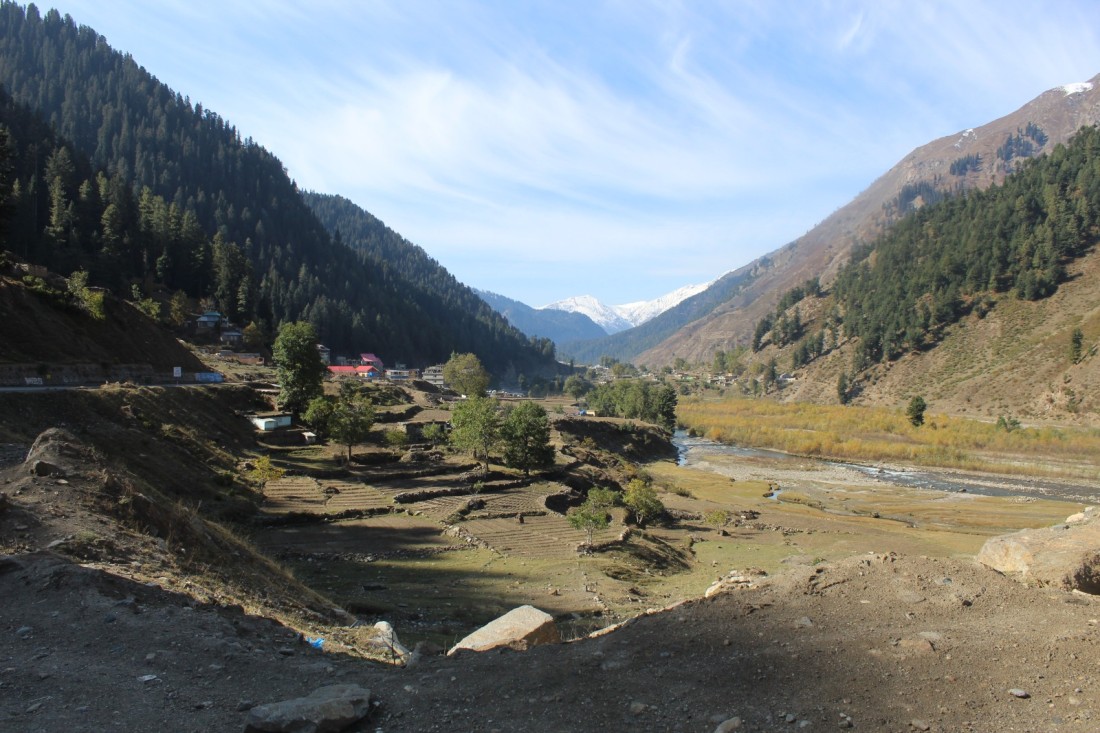
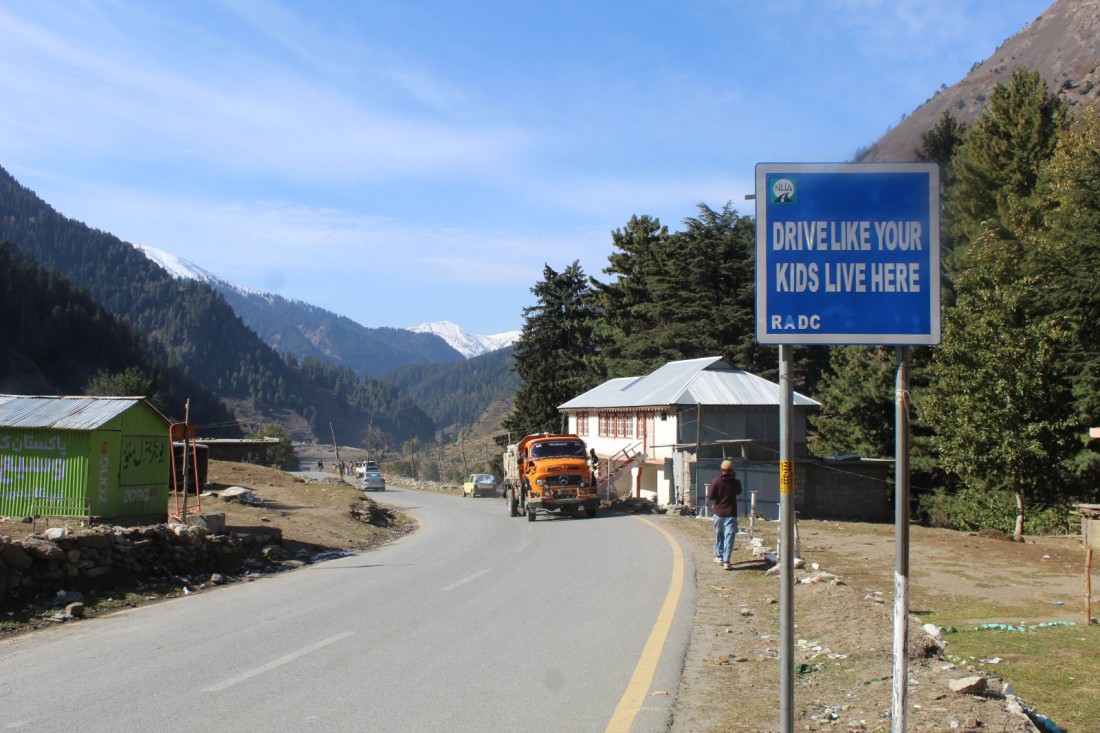
I made it about an hour before some policemen told me to put the bike in their van. I declined, as usual. I told them I didn’t want an escort and they seemed to agree to go away, but then just followed me anyway. I dislike being followed so I decided to stop and take a break. They got bored and left me alone.
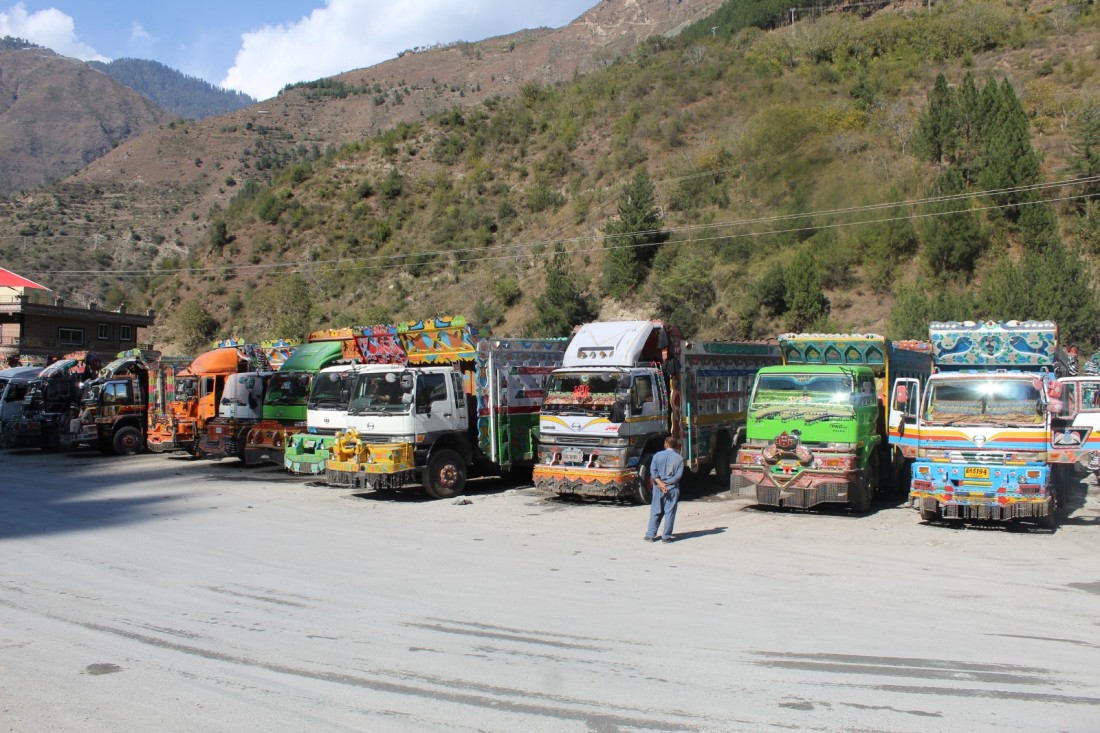
I had another couple hours of freedom before two policemen on a motorcycle started following me. They were insistent that they had to follow me, and were quite annoyed when I stopped to buy some fried potato snacks from a street vendor. I asked how long they planned to follow me for. Surprisingly, they said just three kilometres. Even more surprisingly, they didn’t complain when I stopped for a break three kilometres later.
They drove off and I thought they were going to leave me alone. It turned out, though, that they were waiting behind the next corner when I set off half an hour later.
They followed me for the next couple of hours. At one point, a kid got on the motorbike too. Later the kid and one of the policemen disappeared. Apparently one armed guard was enough to protect me from all the dangerous folk on the road.
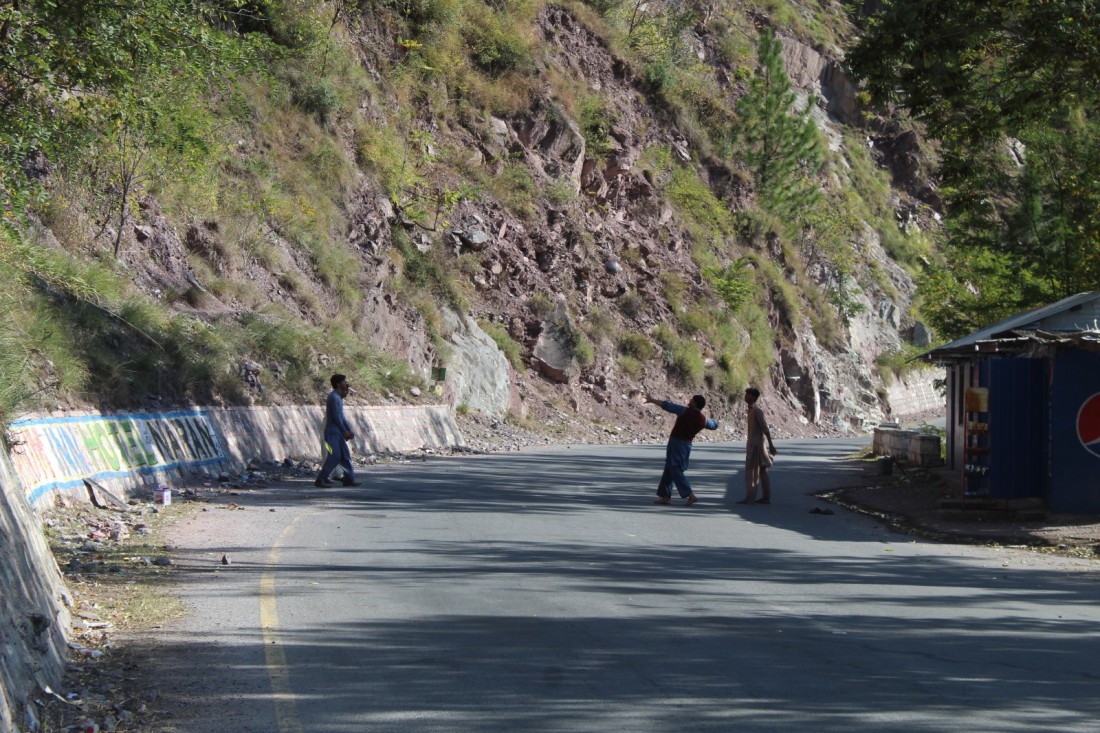

At the town of Balakot, the policeman asked me to wait a minute at the police station there, so they could arrange a new escort. This guy had been quite unobtrusive (i.e. less irritating than most of the police) and I decided to go along with his request. I ended up waiting around for a few minutes as the ETA new escort would arrive was repeatedly pushed back. In the end I told them I was going to continue cycling and they could catch up when they were ready. They protested a bit but not too much.
Two guys caught up on a motorbike a quarter of an hour or so later, as I began a climb of a few hundred metres. It felt so much easier to be climbing at this comparitively low altitude of 1000m!
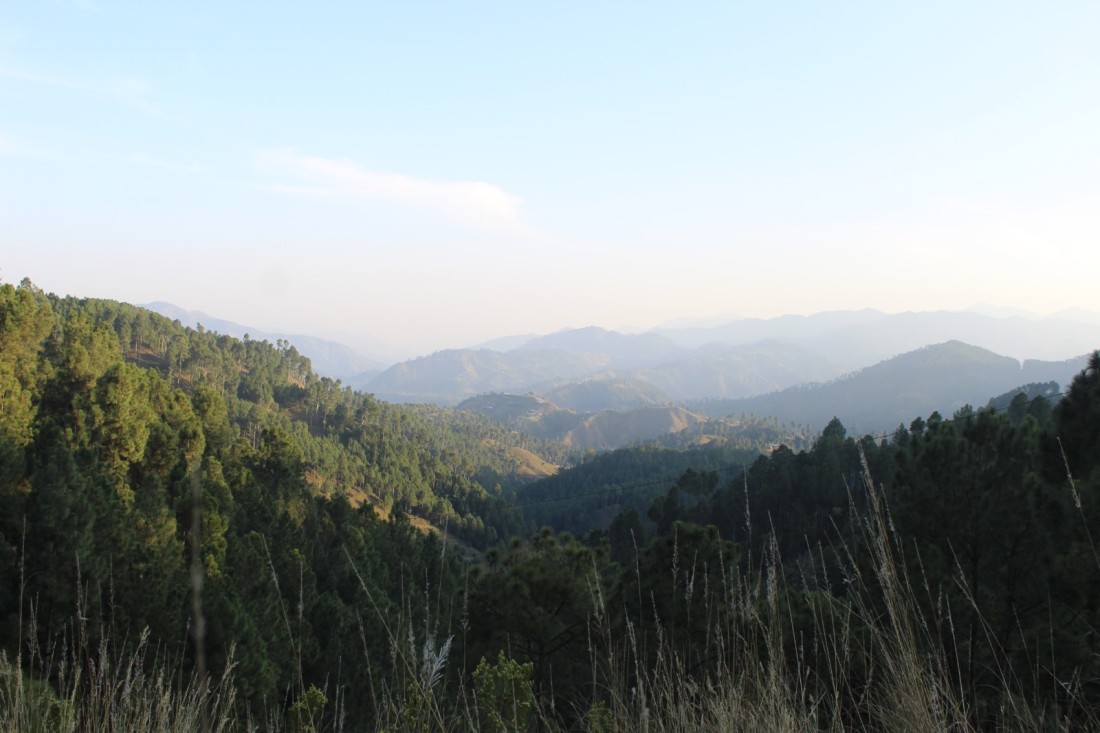
I get a lot of requests for selfies, which I usually decline. I accepted a couple on this climb, including with a couple from Islamabad. After the selfie the police were upset they hadn’t been included, so more photos had to be taken.
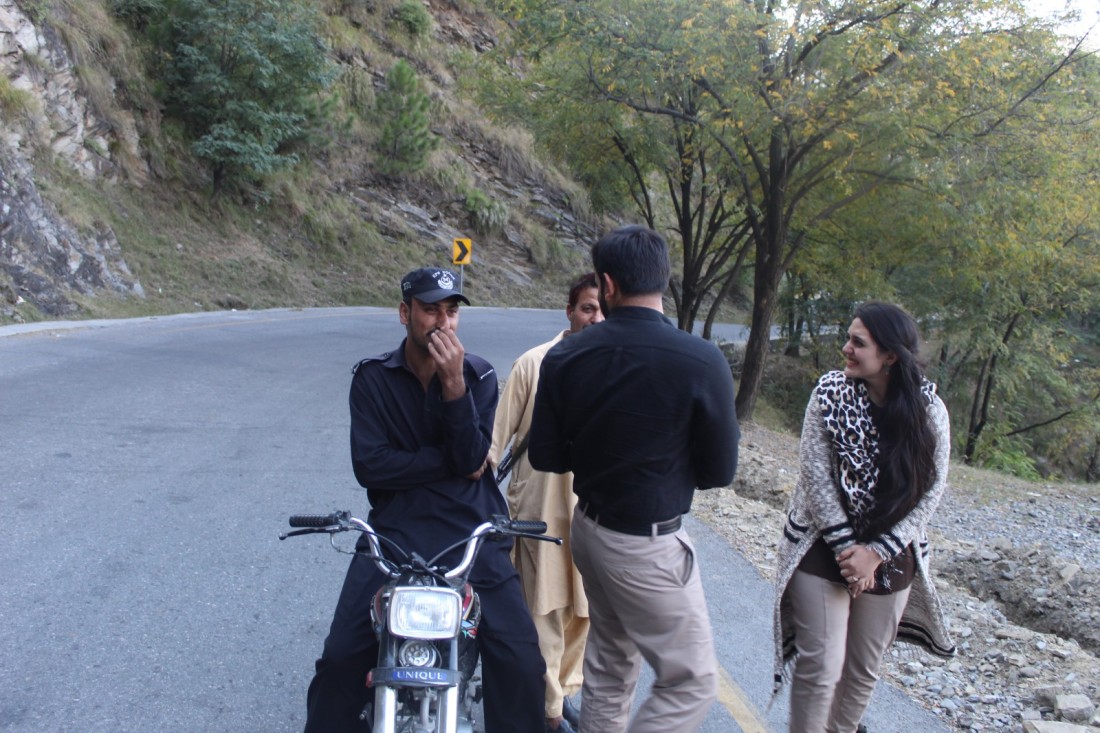
At the end of the climb, the police waved for me to stop. There was a 100m descent ahead and they told me it was far too dangerous to ride a bicycle downhill, so I had to wait for a police van. This was even more ridiculous than usual. I just laughed and set off cycling.
I caught up with the police van a while later. Without stopping, I declined the “offer” of a lift. They seemed to accept it easily enough, and started following me.
Around sunset I stopped at a hotel. The owner was a friendly guy and quoted me a good price so I decided to stay there. This was apparently unacceptable to the police – they wouldn’t be able to provide security here, so I couldn’t stay. We argued a bit but this time they wouldn’t budge.
The hotel owner was quite keen for me to stay – apparently I was the first foreigner to come here. Unfortunately the police were having none of it. They insisted that I go to a guarded hotel in the city ahead. It would doubtless be more expensive so I got them to guarantee I would pay the same price as at this hotel. I didn’t expect them to keep their word, but didn’t really have much choice.
I ended up cycling well into the dark. The police’s ideas about distance were way off – we finally arrived four kilometres after they said there was half a kilometre to go.
Surprisingly, the hotel went along with lowering the price. The manager asked me what time I planned to leave in the morning. I said six o clock, which wasn’t acceptable. He wouldn’t be here until seven and so would be unable to call the police and tell them I was leaving. I pointed out that he could just tell the police now, but that was shot down. Well, this gives me a good motivation to try and leave early, hopefully avoiding the police…

October 24: 103 km
October 25: 85 km
October 26: 124 km